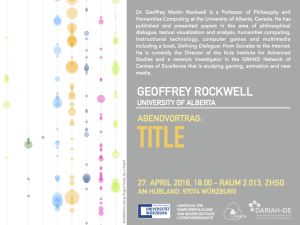
At the end of April I gave a talk at the University of Würzburg on Replication as a way of knowing in the digital humanities. This was sponsored by the Dr. Fotis Jannidis who holds the position of Chair of computer philology and modern German literature there. He and others have built a digital humanities program and interesting research agenda around text mining and German literature. The talk tried out some new ideas Stéfan Sinclair and I are working on. The abstract read:
Much new knowledge in the digital humanities comes from the practices of encoding and programming not through discourse. These practices can be considered forms of modelling in the active sense of making by modelling or, as I like to call them, practices of thinking-through. Alas, these practices and the associated ways of knowing are not captured or communicated very well through the usual academic forms of publication which come out of discursive knowledge traditions. In this talk I will argue for “replication” as a way of thinking-through the making of code. I will give examples and conclude by arguing that such thinking-through replication is critical to the digital literacy needed in the age of big data and algorithms.